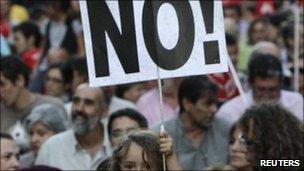Spain's economic recovery stalls
- Published

Austerity measures sparked protests across Spain
Spain's tepid economic growth has ground to a halt with official figures showing the economy did not expand between July and September compared with the previous three months.
The slowdown reflected "lower national income", the National Statistics Institute said.
Spain exited recession when its economy grew 0.1% between January and March. In the second quarter it grew 0.2%.
Spain's near-20% unemployment rate is the highest in the eurozone.
This is acting as a drag on economic growth.
Austerity measures
The third-quarter growth figures confirmed a central bank estimate made last week.
Despite the forecast, some analysts had feared worse.
"This was a slightly better-than-expected performance after several key indicators appeared to suggest that the economy had retreated again in the third quarter," said Raj Badiani at IHS Global Insight.
He highlighted strong exports that helped to offset weak consumer demand.
Spanish economic growth is being hit by austerity measures introduced by the government to try to reduce the country's budget deficit.
These include wage cuts of 5% or more for civil servants and big reductions in public investment plans, designed to reduce the deficit from 11% of GDP to 6% next year.
A number of European economies have announced big cuts is government spending to try to reduce debt levels, most notably Greece, the Irish Republic and the UK.